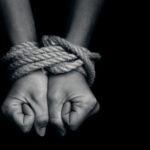The Things We Must Confront
Part of the 5 Courage Killer series
With warning, and seemingly without any provocation, I would go through my daily routine or be hanging out with family or friends, and suddenly I would feel like I was going to die. My breath would grow faint, my palms would sweat and my legs would give out. I remember one time during a school trip, I found myself on a McDonald’s bathroom floor curled into a ball crying. I would later learn that these were panic attacks. Did I tell anyone? No; not until much later. All I knew at 11-years-old was I was sick. I picked myself off the floor, forgetting my order altogether, and jumped on the bus back to school as if nothing had happened. My panic attacks were not ongoing and didn’t reemerge until my late teens and early twenties, one episode was so bad I blacked out for a second or two before calling on Jesus.
It was in college that I finally discovered what brought them on. Fear; fear of not being able to face my current reality or limitations, or facing how I felt at that time. I just didn’t want to say that hurt, or is unfair, or was afraid to disagree with something someone else said. Just like when I was a scared little 11-year-old girl, I wanted to pretend that everything was fine and nothing was wrong with me. I walked around like nothing happened, just because I didn’t want it to happen. The underlining issue was that I had a problem with confrontation. I did not have the heart or the courage to confront how I felt, be it fear of telling the truth about how I felt about a situation or fear of letting go of the façade that “I’m fine.” I bottled my feelings up because I didn’t have the courage to confront my fears.
Confrontation is like the crazy cousin to the 5 Courage Killers but can be just as deadly because when you don’t address this cousin at the door, you might unknowingly let the rest in. Therefore, it is important to face the truth about who you are and be honest about your feelings, so that they don’t manifest in other ways. We must be brave and confront the truth. For me, those fears manifested into anxiety attacks.; I wanted to be “normal” and that quest for normal caused me a lot of inner-turmoil because I was desperate to prove everyone wrong. So, when something was too heavy, I couldn’t walk as far or as fast, I would break my neck, trying to keep up, that is, until one of my aunts told me to, “make the people wait for you.” It really changed my perspective. Her lesson: Don’t try to be something that you’re not, and if people really care about your welfare, they will wait for you. I was so worried about making sure no one discovered any chinks in my armor, I exacerbated the problem. I didn’t want to appear weak. I had to learn and am still learning, that being honest with myself and others makes me that much stronger. The Bible says in:
Ephesians 4:25Amplified Bible (AMP)
25 Therefore, rejecting all falsehood [whether lying, defrauding, telling half-truths, spreading rumors, any such as these], speak truth each one with his neighbor, for we are all parts of one another [and we are all parts of the body of Christ].
Truth and vulnerability are vital aspects of what makes confrontation successful. When we examine the Bible, we can look at Moses as someone who had to deal with inner-conflict of being born a Hebrew but raised an Egyptian prince. The bible says when Moses was grown he saw his brethren being mistreated and killed an Egyptian. All those years of being raised in Pharaoh’s house and yet, he was still emphatic to the plight of his people. This is an example of what can happen when we do not confront problems or disgruntlement that have been festering for a long time. Since he had never dealt with those identity issues, when he was an adult, and he finally confronted them, those feelings lying beneath surface revealed themselves in violence, causing him to leave the home in which he raised, and flee to another land.
How many of us are like Moses and run away from an issue instead of either taking accountability, or addressing the issue head on? Why do we do this? because we are afraid to face the consequences of our actions, whether those consequences are a fall-out with a friend or as a result of our honesty, make our lives uncomfortable. One of the consequences I was afraid of facing was loss of relationship, especially as a child. It led me to tolerate and accept unhealthy behavior from so-called friends, from being called demeaning nicknames like “Bones” and pretending I was OK with it, to numbing myself to insults, convincing everyone the joke went over my head. To me, it was better than crying every day or sitting alone at the lunch table. I felt pressure to roll with the punches, even if I had to hide the buries they left behind.
God does not want us living in bondage or fear. He wants us to be free and to tell the truth, even if it hurts. He doesn’t want us to hold things in at our own expense. Proverbs 4:23-24 Amplified Bible (AMP)reads:
23
Watch over your heart with all diligence,
For from it flow the springs of life.
24
Put away from you a deceitful (lying, misleading) mouth,
And put devious lips far from you.
We need to be free, not clogged up with ambivalence, shame, or hurt because we are afraid to face our friends or loved ones. In the end, Moses had to go back to Egypt and was given an even more difficult task. He had to face Pharaoh, as a former prince and a murder, he had to go back and risk it all for God and his people. We must know who are in God when we begin to confront the things in our lives that matter to us most. God will still fight our battles, but we must be courageous enough to show up and fight. In Moses’s case, God gives him supernatural abilities to bolster his confidence and to provide the Israelites with signs that Moses is a representative from God. Those signs and miracles were to confirm that God is I AM, all they would ever need to leave Egypt and walk into their promise land. It was meant to give them courage and debunk any fears they may have had. However, Moses was still fearful, and his lack of courage and confidence angered God. Why did it anger God? Instead of taking God at his word, he had multiple excuses of why he couldn’t fulfill his assignment: From the people wouldn’t listen to him, to he wasn’t an eloquent speaker.
Exodus 4:10-11New King James Version (NKJV)
10 Then Moses said to the Lord, “O my Lord, I am not eloquent, neither before nor since You have spoken to Your servant, but I am slow of speech and slow of tongue.”
11 So the Lord said to him, “Who has made man’s mouth? Or who makes the mute, the deaf, the seeing, or the blind? Have not I, the Lord?
At times, God want us to address our perceived inadequacies and have faith that we can change through him. There are some situations in life where we must confront and be honest with ourselves, but we must be bold enough to do it. Confrontation isn’t always facing every man but confronting our inner man as well. It may take time to really gain the courage to confront man and ourselves, but once we get in touch with our real feelings… and not what we want them to be, or what will deceptively keep the peace we will heal.





